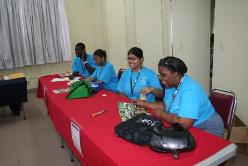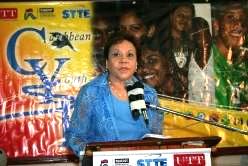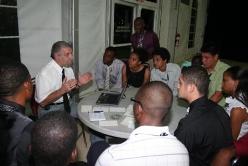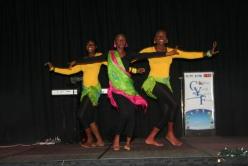Amidst the goodbye tears and the August raindrops, the 8th Caribbean Youth Science Forum (CYSF) came to a close with a Sports Day on Sunday 16th August 2009. Though carded as a day of competitive action among the teams - Banana, Berry, Cherry, Mango, Pawpaw and Plum - the fun and camaraderie were most evident.
CYSF 2009 was rated as an overwhelming success by the participants, who were extremely generous with their descriptions of the event: "Why isn't the Forum two weeks? I don't want to go home - one week is too short!" "I am so happy that I got a chance to meet the forensic scientist and see the pictures from the different cases. I want to do forensic pathology and the meeting re-affirmed this".
From the first day, participants were well aware of their role as the next generation of leading scientists in the region. At an energy foresighting workshop, hosted by Ian Ivey of NEXT Corporation, students outlined and negotiated business plans and deals, while understanding the real-life scenarios and decisions that influence the sustainability of regional development.
The Forum also broadened students' vision of several cutting-edge areas of science and technology in which they could pursue careers. These included telemedicine and "new media" technologies. Students learned too about "green" architecture and renewable energy sources - modern options that point the way towards a more sustainable future. Another session on 3D animation opened them up to a world of endless possibilities in design using basic simulations, motion capture and other techniques with graphics software. The interface between the lecturers and participants was dynamic, with students grasping at the opportunities to get first-hand information on new developments from the experts, and to identify where the needs exist for more trained personnel in these disciplines to build regional capacity.
Field trips exposed the young scientists to various industries in which the application of science and technology is critical in meeting economic and social needs. From natural gas production, nitrogen production, power generation, seismic and agricultural research to port development, airline operations, yachting, navigation, crime scene investigation, participants were provided with a smorgasbord of career possibilities to guide their future study at the tertiary level. In their visit to the NIHERST/NGC National Science Centre, participants enjoyed interactive science exhibits and learned of the novel ways of communicating complex science concepts to non-scientists - approaches that will be useful to them in serving their communities in the future, in whichever fields of study they pursue.
The formal dinner known as "Socializing with Scientists" allowed students to gain "up-close-and-personal" insights from experts about the prerequisites for pursuing various disciplines. Among the guest scientists were a veterinarian, innovator, petroleum geologist, medical doctor, forensic scientist, volcanologist, primary care physician, marine biologist, mechanical engineer, pediatrician, investment analyst and naval architect. The direct, one-on-one conversations with these scientists were greatly appreciated by students.
Another outstanding highlight of the Forum was a fierce debate competition among thirty-four teams of students. Topics this year focused on:
� the future use - positive and negative - of human implants of Radio-Frequency Identification Devices
(RFIDs)
� an analysis of the cause of the current global economic crisis;
� the cost and challenges of implementing health care information technology in the Caribbean; and
� the potential of seventh-generation video games as eventual
substitutes for outdoor physical activity.
The debate series was as educational as it was entertaining, providing judges and participants alike with new perspectives and food for thought on topical issues. The extensive research undertaken was very evident, with the students bringing sound information and demonstrating strong critical thinking in their arguments to back their positions.
The Forum also had its share of "breather" sessions that helped to cement the friendships that were formed. Karaoke night, a cinema lime, telescope viewing and a Friday night party were great times to get-together and relax. Then a scintillating showcase of talent took the stage at the "Caribbean Night" concert, which put the young scientists in the spotlight to demonstrate their artistic skills. An array of performances in various genres including classical Indian dance, poetry, humorous skits and Jamaican jam rock entertained the audience in a well-appreciated production that went well into the night.
Sunday's departure may have caused the tears to flow, but the organizers are certain that CYSF quenched the thirsting minds of students, who came in search of information, guidance and encouragement for their future academic and career pursuits in science. NIHERST is grateful for the tremendous support of the 2009 participants, hosts, chaperones, sponsors, and well-wishers. We are confident that the benefits of the Forum will redound to our region as a whole in the years to come.







